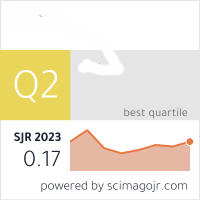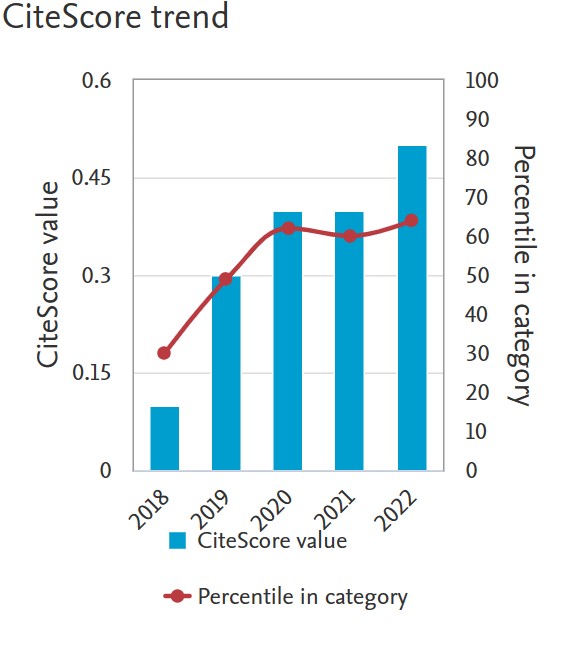Women's Knowledge Regarding Pap Smear and Cervical Cancer in Duhok City in Respect to Related Educational Perspective Session
Keywords:
Knowledge, Educational program, Pap smear and Cervical Cancer.Abstract
Background: Cervical cancer is a serious health problem because of its classification as the fourth commonest one in women all over the world. It is an avoidable cancer. For decreasing the incidence and the related morbidity, the early detection can be extremely important. Therefore, educating women about cervical cancer will help to lower its risks and poor prognosis. Objectives: Assessment of the impact of an educational session on the women’s knowledge about pap smear and the prevention of cervical cancer in Duhok city. Materials and Methods: A quasi-experimental study includes 120 women from7th of January- 28th of April in 2021, who were selected randomly in this study which was conducted at Duhok Hospital of Obstetrics and Gynecology. Results: The study revealed that women's pre-test knowledge about cervical cancer and Pap smears was low; it was also shown that women's failure to receive screenings is due to a lack of information. The mean score knowledge’s level in Pre-test was (29.99±3.44) with the majority (81.7%), were in the moderate score levels, but it was (2.99±0.091) in the post-test knowledge scores with the vast majority (99.2%) were in high scores level. The improvement in the combined knowledge scores of the women before and after the test was statistically significant with a P value of 0.001 Conclusions: The interventional education was successful in improving the women's knowledge of pap smear and cervical cancer.
Downloads
References
Sachan PL, Singh M, Patel ML, &Sachan R.
A Study on Cervical Cancer Screening
Using Pap Smear Test and Clinical
Correlation. Asia Pacific Journal of
Oncology Nursing. 2018; 5(3):337-341.
doi: 10.4103/apjon.apjon 15-18.
Sung H, Ferlay J, Siegel RL, Laversanne M,
Soerjomataram I, Jemal A, et al. Global
cancer statistics 2020:GLOBOCAN
estimates of incidence and mortality
worldwide for 36 cancers in 185 countries
CA Cancer J Clin. 2021; 71: 209-49. doi:
3322/caac.21660.
Central statistical origination CSO. (2020).
Republic of Iraq Ministry of planning.
[Online] Available at:
Arshad SM, Khani-jeihooni A, Moradi Z,
Kouhpayeh SA, Kashfi SM, Dehghan A.
Effect of theory of planned behavior-based
educational intervention on breastfeeding
behavior in pregnant women in
FasaCity,Iran. J Educ Community Health.
; 4(2):55–63.
https://doi.org/10.21859/jech.4.2.55.
. Dsouza JP, Van den Broucke S, Pattanshetty
S, Dhoore W Exploring the barriers to
cervical cancer screening through the lens
of implementers and beneficiaries of the
national screening program:A multicontextual study Asian Pac J Cancer Prev
; 21: 2209-15.
DOI: 10.31557/APJCP.2020.21.8.2209
Algabr GA; AlSaud L; Ismail AA. Knowledge,
attitudes and practices toward cervical cancer
and screening among sexually active Saudi
females visiting a primary care center in Saudi
Arabia. Journal of Family Medicine and
Primary Care. 2022;11(10): 6121-
,DOI: 10.4103/jfmpc.jfmpc_141_22.
Eslamimehr F, Rakhshani F, RamezanKhani A,
Khodakarim S. The examination of the
effectiveness of an educational intervention
based onthe planned behavior theory on
improving pubertal health behavior infemale
high school students. Int J Pediatrics.
;5(9):5643–54.
https://doi.org/10.22038/ijp.2017.24027.2028.
Moradi Z, Moradi P, KhaniJeihooni A,
Dehghan A. Factors associated with pap
smear implementation among women
referring to health carecenters in Fasa,
Iran: an application of theory of planned
behavior. J EducCommunity Health.
;4(1):51–8.
https://doi.org/10.21859/jech.4.1.51
Ghosh S, Mallya S, Shetty RS, Pattanshetty SM,
Pandey D, Kabekkodu SP, et al. Knowledge,
Attitude and Practices Towards Cervical
Cancer and its Screening Among Women
from Tribal Population: a Community-Based
Study from Southern India. Journal of Racial
and Ethnic Health Disparities. 2021; 9: 88–
doi: 10.1007/s40615-020-00760-4
Toh ZQ, Kosasihe J, Russell FM, Garland
SM, Mulholland EK&LicciardiPV .
Recombinant human papillomavirus
nonavalent vaccine in the prevention of
cancers caused by human papillomavirus.
Infection and Drug Resistance. 2019; 12:
-67. doi: 10.2147/IDR.S178381
Ampofo AG, Adumatta AD, Owusu E, AwuviryNewton K A cross-sectional study of barriers
to cervical cancer screening uptake in
Ghana:An application of the health belief
model PLoS One 2020 15 e0231459.
doi.org/10.1371/journal.pone.0231459Rasul VH, Cheraghi MA &Moghdam ZB.
Barriers to cervical cancer screening
among Iraqi Kurdish women: A qualitative
study. Acta Medica Mediterranea.
;32(4):1249-56. PMID: 28255397
Othman RT, Abdullijabar R, Saeed A, Kittani
SS, Sulaiman HM, Mohammed SA.
Cancer Incidence Rates in the Kurdistan
Region/Iraq from. Asian Pacific Journal of
Cancer Prevention. 2011; 12(5): 1261-
PMID: 21875278
Naz MSG, Kariman N, Ebadi A, Ozgoli G,
GhosemiV&Fakari FR. Educational
Interventions for Cervical Cancer
Screening Behavior of Women: A
Systematic Review. Asian Pacific Journal
of Cancer Prevention. 2018; 19:875-84.
doi: 10.22034/APJCP.2018.19.4.875.
Arbyn M, Weiderpass E, Bruni L, et al.
Estimates of incidence and mortality of
cervical cancer in 2018: a worldwide
analysis. The Lancet Glob Health. 2020;
(2): 191–203. doi: 10.1016/S2214-
X(19)30482-6
WHO, 2014. Cancer Country Profiles Iraq.
Available at:
https://www.who.int/cancer/countryprofiles/
irq.
Ahmed N &Taneepanichskul S (2008).
Knowledge, Attitude and Practice of
Dengue Fever Prevention Among the
People in Male', Maldives. J Health Res,
(1):33-7.
Said SA, Hassan HE, Sarhan AE. Effect
of an Educational Intervention on
Women's Knowledge and Attitude
Regarding Cervical Cancer. American
Journal of Nursing Research. 2018; 6 (2)
-66. DOI:10.12691/ajnr-6-2-4.
Ebu NI, MupepiSC, Siakwa MP,
Sampselle CM. Knowledge, practice, and
barriers toward cervical cancer screening
in Elmina, Southern Ghana. Int J
Womens Health. 2014;7:31- 9.
DOI: 10.2147/IJWH.S71797
Mengesha A, Messele A &Beletew B
(2020). Knowledge and attitude towards
cervical cancer among reproductive age
group women in Gondar town, North
West Ethiopia. BMC Public Health, 20(1):
-10.
Al-Meer FM, Aseel MT, Al-khalaf J, Alkuwari MG & Ismail MFS (2011).
Knowledge, attitude and practices
regarding cervical cancer and screening
among women visiting primary health care
in Qatar. Eastern Mediterranean Health
Journal, 17(11): 855-61.
Singh M, Patel ML &Sachan R (2018). A
Study on Cervical Cancer Screening Using
Pap Smear Test and Clinical Correlation.
Asia Pacific Journal of Oncology Nursing,
(3):337-341.
Ahmed, S. R., Esa, A. M., & El-zayat, O.
S. (2018). Health Belief Model-based
educational program about cervical cancer
prevention on women knowledge and
beliefs. Egyptian Nursing Journal, 15, 39-
Abiodun OA, Abiodun OO, Sotunsa JO,
Oluwole FA, . Impact of health education
intervention on knowledge and perception
of cervical cancer and cervical screening
uptake among adult women in rural
communities in Nigeria.BMC public
Health.2014; 814 .DOI: 10.1186/1471-
-14-814
Rasul VH, Cheraghi MA &Moghdam ZB
(2016). Barriers to cervical cancer
screening among Iraqi Kurdish women: A
qualitative study. Acta Medica
Mediterranea, 32(4):1249-56.
Getachew S, Getachew E, Gizaw M,
Ayele W, Addissie A, Kantelhardt EJ
(2019). Cervical cancer screening
knowledge and barriers among women in
Addis Ababa, Ethiopia. PLOS ONE,
(5):1-13.
Koç Z, Őzdeş EK, Topatan S, Ҫinarli T,
Ṣener A, Danaci E, et al (2019). The
Impact of Education About Cervical
Cancer and Human Papillomavirus on
Women's Healthy Lifestyle Behaviors and
Beliefs. Cancer Nursing, 42(2):106-18.
K SA, Shanbhag S, Joseph RC& K VS
(2020). A Study of Maternal BreastFeeding Issues during Early Postnatal
Days. SciMedicine Journal, 2(4): 219-24
Downloads
Published
Issue
Section
License
You are free to:
- Share — copy and redistribute the material in any medium or format for any purpose, even commercially.
- Adapt — remix, transform, and build upon the material for any purpose, even commercially.
- The licensor cannot revoke these freedoms as long as you follow the license terms.
Under the following terms:
- Attribution — You must give appropriate credit , provide a link to the license, and indicate if changes were made . You may do so in any reasonable manner, but not in any way that suggests the licensor endorses you or your use.
- No additional restrictions — You may not apply legal terms or technological measures that legally restrict others from doing anything the license permits.
Notices:
You do not have to comply with the license for elements of the material in the public domain or where your use is permitted by an applicable exception or limitation .
No warranties are given. The license may not give you all of the permissions necessary for your intended use. For example, other rights such as publicity, privacy, or moral rights may limit how you use the material.











